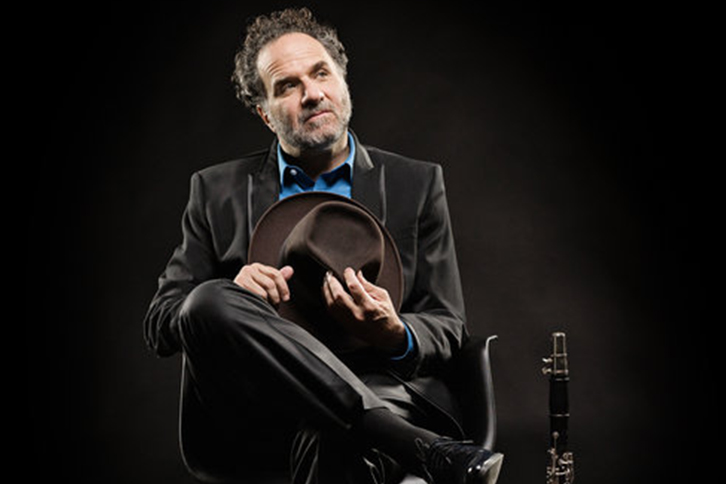by Jarrett Hoffman

“There was this moment where I thought, wow, I kind of threw the baby out with the bathwater,” Krakauer told me during a recent phone call. “I wanted to get back to improvising and playing ‘off the page.’”
He took an interest in klezmer music, “almost as a hobby,” he said, and started doing small gigs at Jewish community centers. “I was suddenly learning all about the Jewishness that I hadn’t really known I had. There was a shock of recognition in playing that music — I thought, this sounds like the strong Yiddish accent of my grandmother. I felt like I had come home in a way.”
These days, Krakauer still inhabits the worlds of classical and contemporary music in addition to klezmer — a genre which he has melded with funk, jazz, and hip-hop through various projects to create his own musical concoction for the 21st century.
One of those projects is his “Ancestral Groove” program. Krakauer and his bandmates — guitarist Sheryl Bailey, electric bassist Jerome Harris, drummer Michael Sarin, and sampler Jeremy Flower — will bring that project to Ford Family Recital Hall at DeYor Performing Arts Center in Youngstown on Saturday, April 27 at 8:00 pm, closing out the inaugural season of the Pipino Performing Arts Series.
So what exactly is this ancestral groove? “If you wanted to encapsulate it for an audience, it’s a journey through identity,” Krakauer said. He and his band will play several of his own compositions exploring that search for identity, in addition to performing classic klezmer tunes.
Another part of the program is stories — like the ones he told me over the phone. He said that growing up in New York City, he was a “100% assimilated American kid,” and that his grandparents and great-grandparents had immediately discarded their Ashkenazic Jewish culture upon coming to America. “They wanted to assimilate,” he said. “They had come from religious persecution and economic hardship, and they just wanted to move on.”
At the center of his family story is immigration, which in today’s world is charged with politics. “Look at all the different groups of people who have built America, and done great things for this country,” Krakauer said. “I try to make that point to audiences in a gentle way.”
More and more, Krakauer feels a responsibility as an artist and as a person to provide a positive counterforce to racism and anti-immigrant feelings. “I’m trying to do my bit to be a good citizen in society and impart a message of tolerance and understanding,” he said.
Asked if he’s ever experienced political pushback from audiences, he recalled one concert in France when he was talking to the audience — he speaks fluent French — and someone yelled out angrily: “Palestina!”
Krakauer stopped everything and spoke directly to the man. “I told him, ‘Excuse me sir, but this concert is a safe place where we are here to love and understand each other. Governments are manipulating people to hate each other, but do you see me waving a flag? I’m talking about Jewish traditions and people — not the Israeli government.’”
As Krakauer went on with the concert, he looked out into the audience, and noticed that the man stayed. “I felt like that was a small victory,” he told me. “I didn’t invalidate his feelings. I just tried to tell him, ‘Let’s not mix apples and oranges.’ I was actually thankful for him to express himself that way, because then I had an opportunity to offer another way of looking at that.”
Published on ClevelandClassical.com April 23, 2019.
Click here for a printable copy of this article

